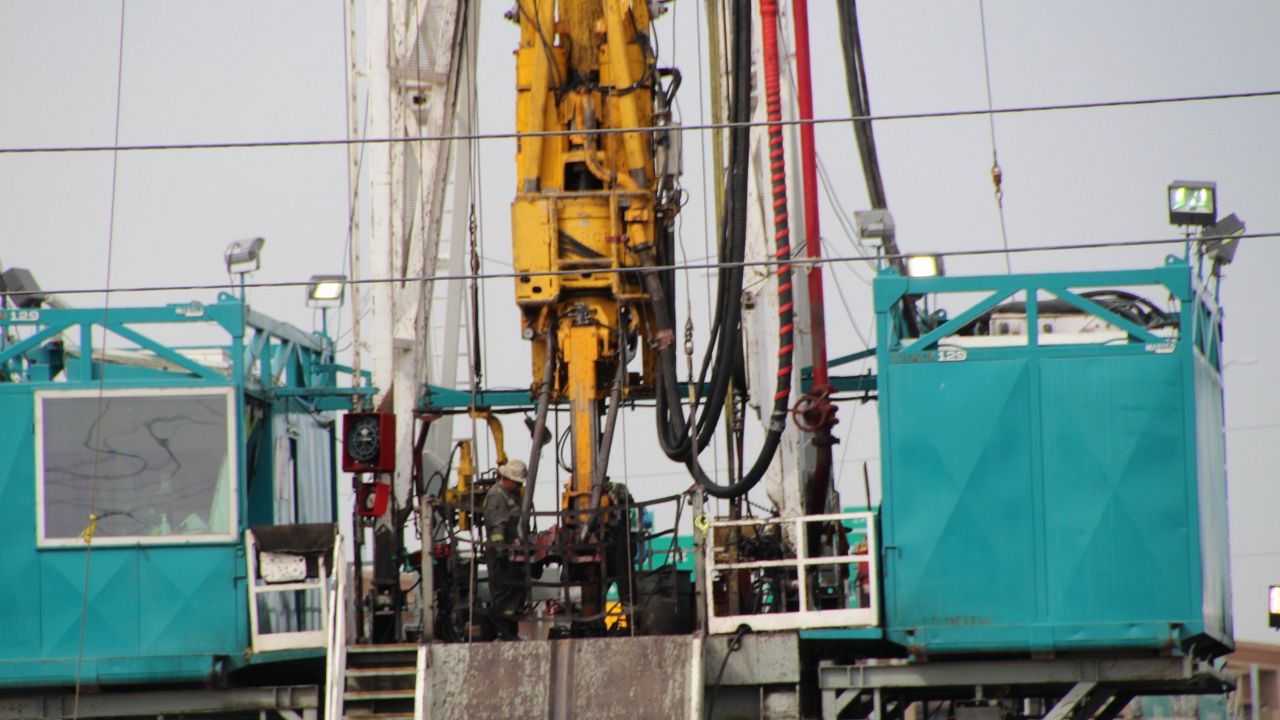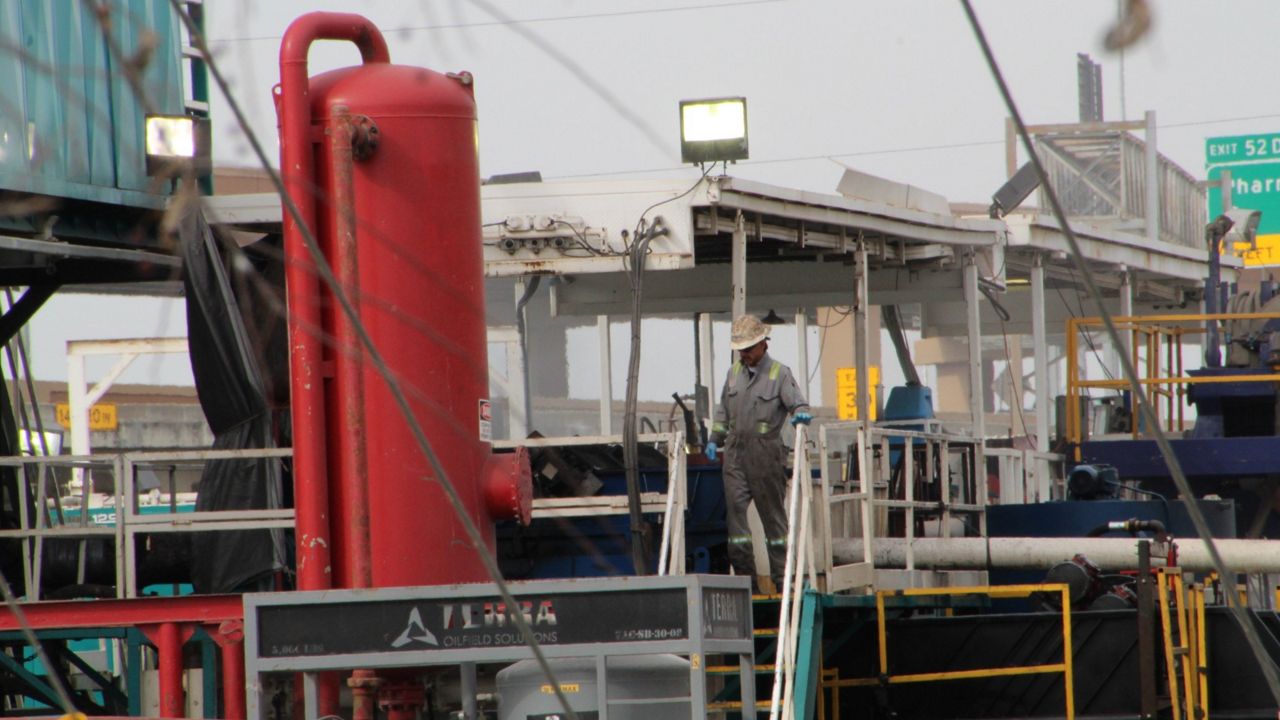FORT WORTH, Texas — Fort Worth resident Cyndy Dwyer had just moved her family to the newly developed Scenic Bluff neighborhood in the northeast part of town. From her front porch, she enjoys a panoramic view of downtown, with a Top Golf and Interstate 35 adding to the surreal in-but-not-of-the-city esthetic. Her family was one of the first to buy a home in the new area after moving from Austin via Flower Mound. Last Christmas, the honeymoon period of her new digs was dampened when she saw a site from her front yard that conjured bad memories.
“I look out and see what looks like the top of a drilling rig,” she said. “I thought, ‘No, it can’t be.’ Sure enough, that’s what was happening. They were starting to erect their platform.”
TEP Barnett, the local arm of French-owned company Total, was permitted to drill three gas wells in a small area between the nearby Top Golf and I-35. For Dwyer, the sight was familiar. She was a part of the grassroots effort to resist urban gas drilling in Flower Mound, where she lived before moving to South Texas.
Now that the price of operating wells has plummeted since COVID-19 hit, Total is aggressively buying existing wells and applying for permits for new wells all over the region. The company received approval from the Railroad Commission of Texas to drill 26 new wells in Fort Worth, Arlington, White Settlement, and North Richland Hills. Besides the three near downtown, the company has been approved to drill seven wells near a preschool and other medical facilities in Arlington –– which appears to violate the city’s ordinance. The energy giant isn’t allowed to drill in its native France, where gas drilling has been outlawed due to the health and environmental concerns associated with the practice.
It wasn’t too long ago that the Barnett Shale was booming in North Texas, as cities all around the region became guinea pigs in the urban gas drilling experiment. As royalty checks and thousands of jobs flowed into North Texas, so too did large trucks that destroyed many residential streets that couldn’t handle their weight, huge and noisy pad sites that shined their bright lights at all hours of the night, and a cocktail of carcinogens that were spewed into the air, creeks, rivers, and leaked onto the local landscapes, leaving huge swaths of dead plants and animals in their wake. All over the region, asthma and cancer rates spiked as city governments ignored the warnings of scientists and researchers in favor of industry consultants who assured the municipalities drilling was safe –– while at the same time handing over cash by the truckload.
In the early days of the drilling frenzy, almost two decades ago now, cities such as Fort Worth welcomed the drillers gladly. Fort Worth’s gas drilling oversight committee was composed exclusively of oil and gas executives and was largely viewed by critics as toothless. The city didn’t conduct an environmental impact study until years after the City Council had permitted hundreds of wells, and even that was seen as a deeply flawed by most impartial observers.
The oil and gas companies used their considerable capital and robust public relations departments to distract from the dangers of their trade. Museums were funded, charity events were sponsored, and local real estate was booming all with oil and gas money.
Then, around 2008, the price of oil plummeted and the boom, which had been slowing for years, went bust. Oil and gas companies pulled up stakes in the area and left behind broken down equipment, toxic frack ponds, barren and dead landscapes, empty buildings, and crippled economies.
Many activists and opponents of urban gas drilling think the Barnett Shale drilling saga has been over for years –– and local elected officials have been heeding the hard-learned lessons of the recent past.
Total’s new, aggressive play in the area is surprising many, but not Sharon Wilson, a senior field advocate for Earthworks and the Oil and Gas Accountability Project. Wilson has been a harsh critic and watchdog of the local oil and gas industry since the Barnett Shale boom began.
“People in Fort Worth, the great activists who were in that city, they think the Barnett Shale is over,” she said. “My attempts to say, ‘This isn’t really over,’ haven’t really resonated with them yet.
“Total is a French energy giant, but they are having some financial problems,” she continued. “This is going to create more infrastructure that can’t be cleaned up. They intend to drill a lot of wells here and they’re a very bad actor.”
In June, the unthinkable happened for those who have been following the oil and gas industry in Texas. The Arlington City Council denied a permit that would have allowed TEP Barnett to build three gas wells near a preschool in one of the poorest parts of the city. The denial of a drilling permit was so rare, the Council’s 6-3 vote against the permit made state and national news.
One of the factors in the Council’s decision was the attention the wells drew from the community. Livable Arlington, a local environmental watchdog group, notified thousands of citizens about the wells and their potential environmental impact. Hundreds of people who opposed the drilling attended public meetings and voiced their displeasure.
“The history of these public hearings in Arlington has been nobody shows up, they last 10 minutes, and they always get approval,” said Ranjana Bhandari, director of Liveable Arlington. “In the last three years, our organization has turned these hearings into real public hearings. We’ve brought scientists, doctors, nurses, physicians.”
Generally, when a gas driller wants to operate in a city, the company has to notify everyone within a quarter-mile radius. Then, the driller is required to hold a public meeting and gather community input. After that, the issue goes to planning and zoning boards for another public hearing, before the issue is then passed to the City Council for a final vote.

In Arlington, the official setback –– how far away a building should be from gas wells –– is 600 feet, but the City Council can vote to change that to 300 feet. TEP Barnett’s seven newest permitted wells are just a few hundred feet away from rows of homes, 15 medical facilities, and a daycare –– all of which carry higher setback protection in the city’s ordinance. There was no public hearing for this latest spate of wells, ironically called the Rocking Horse drill site, nor was there any public notification or City Council vote.
For TEP Barnett’s new wells, the city of Arlington bypassed its own process thanks to a procedural mechanism known as a specific use permit. When a driller is using an existing site, one that’s already been approved, the city can rubber-stamp the permits without public scrutiny. The drill site was approved in 2013, before any of the medical facilities were built. There have also been countless papers, articles, and studies conducted on the dangers of drilling near residential neighborhoods over the past seven years.
Bhandari, an economist by trade, was at the public meeting in 2013. Even then, she said, people warned against the wide range of dangers brought to bear by drilling, including contributing to climate change, damaging the local water supply, causing earthquakes, and increasing nearby residents’ risk of developing cancer.
The City Council, she said, “are contravening their own procedures, desperate to avoid public hearings. When all of this drilling was being permitted a few years ago, people weren’t aware of the risks and dangers. There wasn’t too much research on the public health issues that arise when you live close to drilling. There was very little research about the harm to children, (and) air quality.
“They can’t claim ignorance anymore because Livable Arlington has spent five years educating them,” she continued. “I have taken all kinds of pieces of research to them; our members have met with them; showed them the pollution; invited them to events where we’ve invited scientists and doctors –– and they’ve refused to attend. I think that veil of ignorance, they can’t hide behind it anymore like they did 10 years ago.”
The city stands to gain financially from TEP Barnett’s Rocking Horse site. Part of the area being mined for natural gas includes the Arlington Municipal Airport, and the city owns the mineral rights to that property. The city also collects various administrative fees from the site.
According to a city’s spokesperson, the wells meet the required setback of 300 feet from the nearby preschool, but that measurement was taken from the building, not the playground, which is well inside 300 feet. The medical offices, the city spokeswoman pointed out, are also more than 300 feet away from the approved wells –– at 337 feet.
For Bhandari and other critics of the city, her elected officials aren’t doing enough to keep residents safe.
“There needs to be a complete reevaluation of the old decisions based on the community’s lived experience and the new science,” she said. “What’s really troubling is that it establishes a terrible precedence. We’ve been told that there are close to 20 other drill sites they are planning to do this.”
Every time Cyndy Dwyer drives by the wells near her home, she develops a cough. An acrid smell hangs in the hair, so strong that some of her neighbors can smell it from more than a mile away.
“You drive by that site and it takes your breath away,” she said. “And it lingers with you. The last time I developed a cough, I had it for up to a week. And that was the only thing that had changed –– I drove by this site.”
What she’s smelling is a toxic stew known as drilling mud. Thousands of gallons of water are used in the hydraulic fracturing or fracking process. That water carries countless carcinogens into the top layer of dirt, which, in many cases, is spread over the land like poison jelly on toast. In other cases, like the pad site near Dwyer’s home, the mud is stored in flimsy containment tanks.
In its site near downtown Fort Worth, TEP Barnett is using what’s known as oil-based drilling mud, largely considered to be the most toxic. According to WorkSafe, an organization that advocates for worker safety, “More than 250 chemicals can be used to create drilling fluid. Some can cause serious illness, including cancer.” Some of the known risks associated with oil-based drilling mud include dizziness, headaches, nausea, and cancer.

Dwyer has twice complained to the TCEQ about the smell from the wells. TCEQ documents show that an inspector came and found the threat “negligible,” though Wilson points out that he broke numerous protocols, which includes conducting the inspection during rainy weather, which can depress emissions.
Wilson, who uses an optical gas imaging instrument that makes pollution visible, said she recorded large plumes of volatile organic compounds coming from the drill site, and that she became dizzy while downwind of the clouds of pollution.
So far, the city hasn’t received permit requests from TEP Barnett. City officials did not respond to questions from Spectrum News by deadline.
A TCEQ spokesperson said the agency stands behind its inspector’s report and believes TEP Barnett is drilling safely.
TEP Barnett did not respond to multiple phone calls.
For activists like Bhandari, Dwyer, and Wilson, Total’s aggressive entry into the area feels like a second wave of a battle that never ended.
“Industry keeps making these promises, and they’ve been making them for years," Wilson said. “They were making promises they were going to clean up their act. The more permits we issue, the more wells they are going to drill, the higher the methane will go, and the more wells we’re going to have to clean up later.”



